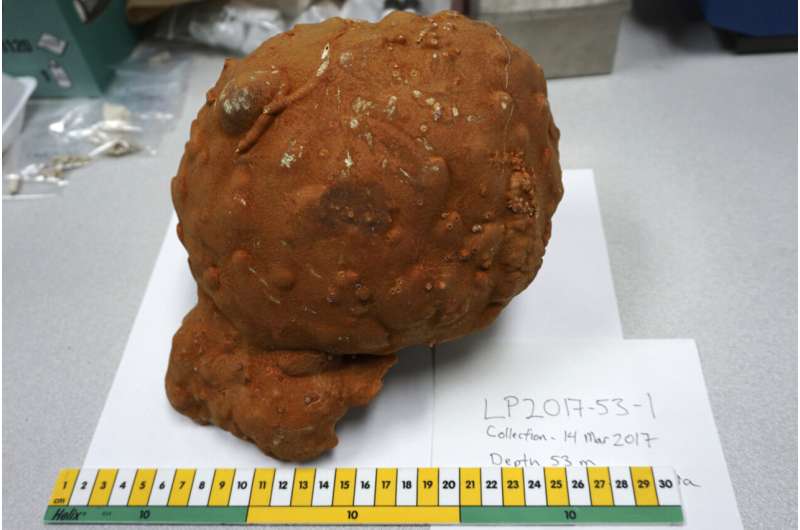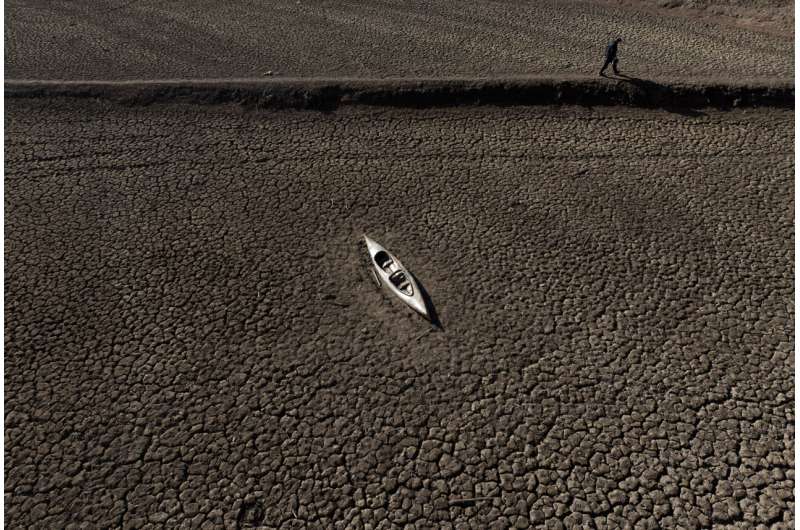This article has been reviewed according to Science X's editorial process and policies. Editors have highlighted the following attributes while ensuring the content's credibility:
fact-checked
peer-reviewed publication
reputable news agency
proofread
Ocean sponges suggest Earth has warmed longer, more than thought; some scientists dubious

A handful of centuries-old sponges from deep in the Caribbean are causing some scientists to think human-caused climate change began sooner and has heated the world more than they thought.
They calculate that the world has already gone past the internationally approved target of limiting global warming to 1.5 degrees Celsius (2.7 degrees Fahrenheit) since pre-industrial times, hitting 1.7 degrees (3.1 degrees Fahrenheit) as of 2020. They analyzed six of the long-lived sponges—simple animals that filter water—for growth records that document changes in water temperature, acidity and carbon dioxide levels in the air, according to a study in Monday's journal Nature Climate Change.
Other scientists were skeptical of the study's claim that the world has warmed that much more than thought. But if the sponge calculations are right, there are big repercussions, the study authors said.
"The big picture is that the global warming clock for emissions reductions to minimize the risk of dangerous climate changes is being brought forward by at least a decade," study lead author Malcolm McCulloch, a marine geochemist at the University of Western Australia. "Basically, time's running out."
"We have a decade less than we thought," McCulloch told The Associated Press. "It's really a diary of—what's the word?—impending disaster."

In the past several years, scientists have noted more extreme and harmful weather—floods, storms, droughts and heat waves—than they had expected for the current level of warming. One explanation for that would be if there was more warming than scientists had initially calculated, said study co-author Amos Winter, a paleo oceanographer at Indiana State University. He said this study also supports the theory that climate change is accelerating, proposed last year by former NASA top scientist James Hansen.
"This is not good news for global climate change as it implies more warming," said Cornell University climate scientist Natalie Mahowald, who was not part of the study.
Many sponge species live long, and as they grow they record the conditions of the environment around them in their skeletons. Scientists have long used sponges along with other proxies—tree rings, ice cores and coral—that naturally show the record of changes in the environment over centuries. Doing so helps fill in data from before the 20th century.
Sponges—unlike coral, tree rings and ice cores—get water flowing from all over through them so they can record a larger area of ecological change, Winter and McCulloch said.

They used measurements from a rare species of small and hard-shelled sponges to create a temperature record for the 1800s that differs greatly from the scientifically accepted versions used by the United Nations' Intergovernmental Panel on Climate Change. The study finds that the mid-1800s were about half a degree Celsius cooler than previously thought, with warming from heat-trapping gases kicking in about 80 years earlier than the measurements the IPCC uses. IPCC figures show warming kicking in just after 1900.
It makes sense that the warming started earlier than the IPCC says because by the mid-1800s the Industrial Revolution had begun and carbon dioxide was being spewed into the air, said McCulloch and Winter. Carbon dioxide and other gases from the burning of fossil fuels are what causes climate change, scientists have established.
Winter and McCulloch said these rusty orange long-lived sponges—one of them was more than 320 years old when it was collected—are special in a way that makes them an ideal measuring tool, better than what scientists used in the mid- to late 1800s.
"They are cathedrals of history, of human history, recording carbon dioxide in the the atmosphere, temperature of the water and pH of the water," Winter said.

"They're beautiful," he said. "They're not easy to find. You need a special team of divers to find them."
That's because they live 100 to 300 feet deep (33 meters to 98 meters) in the dark, Winter said.
The IPCC and most scientists use temperature data for the mid-1800s that came from ships whose crews would take temperature readings by lowering wooden buckets to dip up water. Some of those measurements could be skewed depending on how the collection was done—for example, if the water was collected near a warm steamship engine. But the sponges are more accurate because scientists can track regular tiny deposits of calcium and strontium on the critters' skeleton. Warmer water would lead to more strontium compared to calcium, and and cooler water would lead to higher proportions of calcium compared to strontium, Winter said.
University of Pennsylvania climate scientist Michael Mann, who wasn't part of the study, has long disagreed with the IPCC's baseline and thinks warming started earlier. But he was still skeptical of the study's findings.

"In my view it begs credulity to claim that the instrumental record is wrong based on paleo-sponges from one region of the world. It honestly doesn't make any sense to me," Mann said.
In a news briefing, Winter and McCulloch repeatedly defended the use of sponges as an accurate proxy for world temperature changes. They said except for the 1800s, their temperature reconstruction based on sponges matches global records from instruments and other proxies like coral, ice cores and tree rings.
And even though these sponges are only in the Caribbean, McCulloch and Winter said they are a good representation for the rest of the world because they're at a depth that doesn't get too affected by warm and cold cycles of El Niño and La Niña, and the water matches well with global ocean temperatures, McCulloch and Winter said.
Princeton University climate scientist Michael Oppenheimer, who also wasn't part of the sponge study, said even if the McCulloch team is right about a cooler baseline in the 1800s that shouldn't really change the danger levels that scientists set in their reports. That's because the danger levels "were not tied to the absolute value of preindustrial temperatures" but more about how much temperatures changed from that time, he said.

Although the study stopped at 2020 with 1.7 degrees Celsius (3.1 degrees Fahrenheit) in warming since pre-industrial times, a record hot 2023 pushes that up to 1.8 degrees (3.2 degrees Fahrenheit), McCulloch said.
"The rate of change is much faster than we thought," McCulloch said. "We're heading into very dangerous high-risk scenarios for the future. And the only way to stop this is to reduce emissions. Urgently. Most urgently."
More information: Malcolm T. McCulloch et al, 300 years of sclerosponge thermometry shows global warming has exceeded 1.5 °C, Nature Climate Change (2024). DOI: 10.1038/s41558-023-01919-7
Wenfeng Deng, Ocean warming and warning, Nature Climate Change (2024). DOI: 10.1038/s41558-023-01921-z
Journal information: Nature Climate Change
© 2024 The Associated Press. All rights reserved. This material may not be published, broadcast, rewritten or redistributed without permission.




















